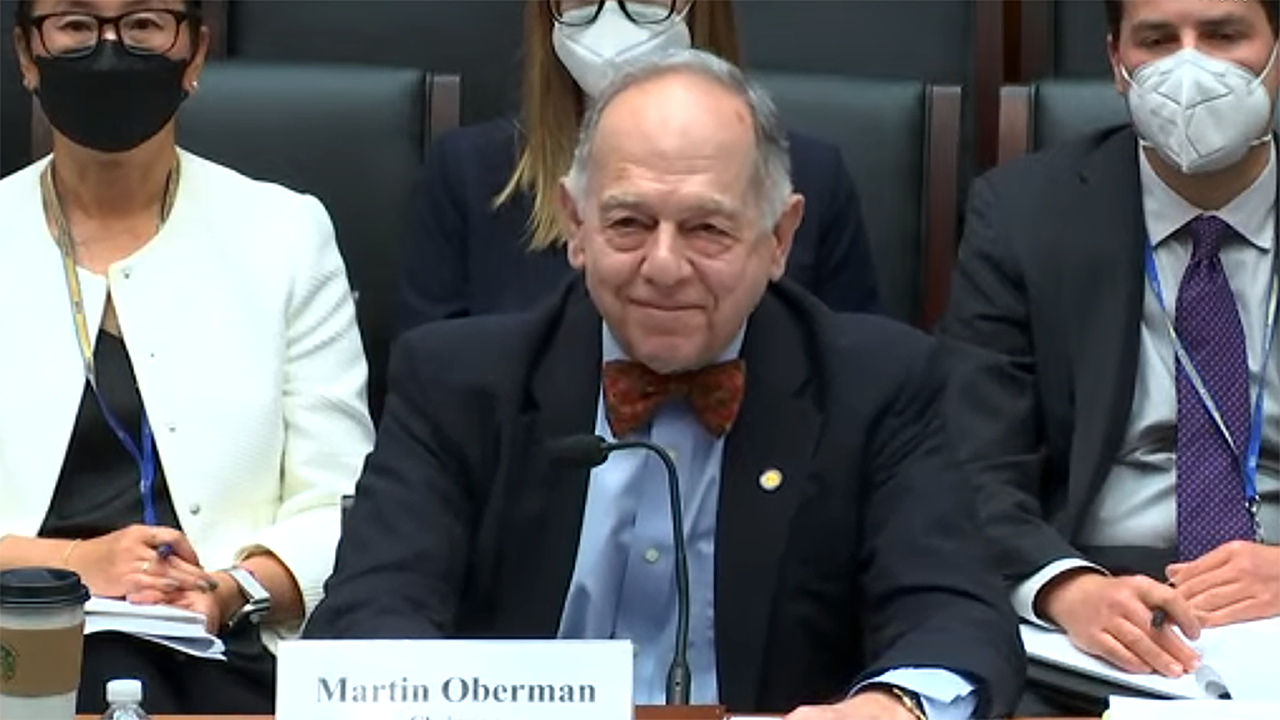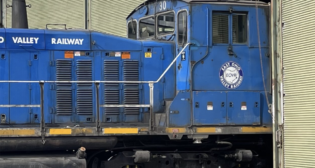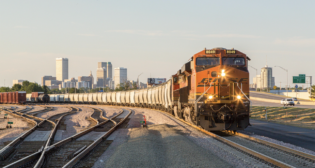
Oberman, the Pragmatist, May be Missed
Written by Frank N. Wilner, Capitol Hill Contributing Editor
Screen shot from an STB hearing on rail service.
WATCHING WASHINGTON, RAILWAY AGE DECEMBER 2023 ISSUE: News item: Surface Transportation Board (STB) Chairperson Martin J. Oberman will not seek renomination to a second term and depart in “early 2024.”
Since his January 2019 Senate confirmation, and promotion to chair by President Biden in 2021, Democrat Oberman has belligerently clanged a tocsin bemoaning lack of rail-to-rail competition and a Wall Street encouraged C-suite culture of rewarding investors to the impairment of labor, service and market share growth.
Oberman’s rhetoric is that of an unrepentant regulator. Yet his record of actions doesn’t match the talk, allege captive shippers who lack effective transportation alternatives to rail.
Lamented is his deafness to shipper requests he support imposing a revenue adequacy constraint on rate increases where railroads are market dominant; voting to terminate, as a remedy for rail market-power abuse, a reciprocal switching remedy (granting a second railroad access to another’s sole-served terminal); declining to support a remedy for unreasonable fuel surcharges; permitting Class I’s to veto STB arbitration for rate reasonableness complaints; and not advancing a rulemaking to revoke previously granted commodity exemptions from regulation as justified by market-power abuse.
“There really is no path to provide meaningful regulation to address the power differential between railroads and shippers,” former STB member and Democrat Deb Miller (2014-2018),” told Railway Age.
Perhaps this explains Oberman’s embracing a pragmatic approach, attempting moral suasion where a consensus for more aggressive regulation is doubtful, or choosing easier to achieve—yet less shipper beneficial—approaches as finding service inadequate in individual complaint cases.
But Oberman isn’t done. Before he departs, the STB will vote to establish operating performance metrics and whether to make reciprocal switching a remedy for yet-to-be-determined rail service failures. If the trigger, as the remedy now provides, is rail service near the nadir of its historic low, the relief could be meaningless. And if minimum operating performance metrics require more resources (capital and labor) for adherence, it will be a tax (rate increase) on shippers.
His legacy on the line, Oberman’s rhetoric has reached a crescendo. Recently, he delivered a knife-edged impeachment—infused with oratory more suited to Sen. Bernie Sanders (I-Vt.)—of the rail industry’s chummy relationship with Wall Street, alleging that “for too many years,” railroad leaders “utterly failed to lead” by “cutting both the quality and quantity of output” to lower operating ratios and boost profit.
Oberman cited Class I railroad headcount reductions and a return to investors, through dividends and share buybacks, of $253 billion over the past 14 years, while reinvesting but $40 billion to expand capacity.
“For too many years, much of the corporate leadership of these railroads utterly failed to lead,” Oberman said. “They failed to enlighten their owners [investors] that the railroads will succeed in producing a better and longer return on investment if they spend more of their profits on building infrastructure and retaining the workers needed to regain their share of the market, which they have been consistently losing to truck over the past few decades … and even more important, attract new customers and more revenue.”
Railroads, he said, citing a 19th century Supreme Court decision, “primarily owe duties to the public of a higher nature even than that of earning large dividends for their shareholders.”
Oberman’s critics cite the collapse of high-margin coal traffic (down 21% alone in 2023), fundamental shifts in manufacturing and the threat of driverless trucks poaching already low-margin intermodal as incentives to return cash to investors. Mainstream economists agree that if an enterprise such as railroads isn’t as attractive as other enterprises, then management should return funds to investors.

Frustrating to shippers is Oberman’s pragmatic, consensus-seeking approach, thinking he missed an opportunity to use his Democratic majority to achieve more. Some shippers look to his successor to be more aggressive in that regard. The risk of a new chairperson acting in a more partisan manner is that it will lead to widespread swings in regulation, spooking further investment and imposing greater pressure on rail management to disinvest.
Frank N. Wilner’s new book, Railroads & Economic Regulation, is available from Simmons-Boardman Books at www.transalert.com, 800-228-9670.



